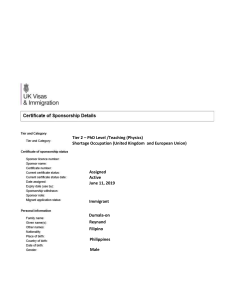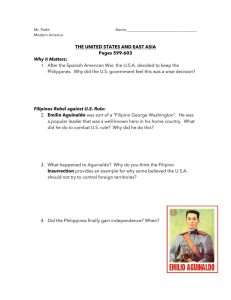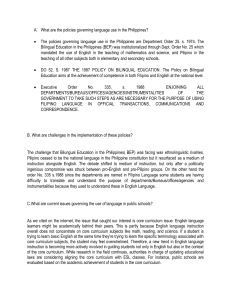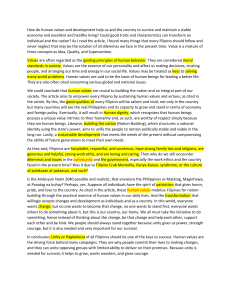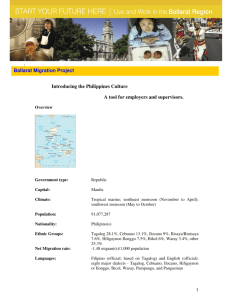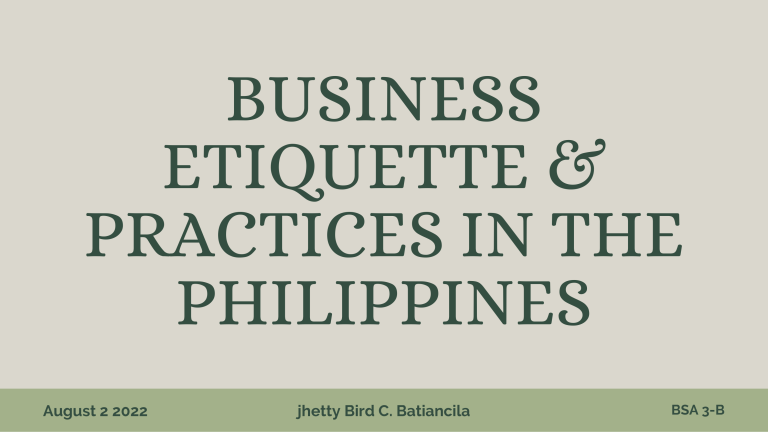
BUSINESS ETIQUETTE & PRACTICES IN THE PHILIPPINES August 2 2022 jhetty Bird C. Batiancila BSA 3-B Business Etiquette and Practices in the Philippines Business transactions are always best conducted face-to-face in a cozy and welcoming setting because the business environment in the Philippines is heavily reliant on interpersonal connections. Filipinos are oblique, in contrast to Danes and many other Westerners who are often forthright and prefer to get right to the point. Before getting to the business meeting's primary agenda, they love introducing themselves, telling a joke or two, and talking about their respective friends and families. For a Filipino, making friends, creating useful contacts, and establishing a rapport with someone personally advance business. Philippine Culture: Behavior, Culture, Business Etiquette, and Language Similar to other Asian countries, society in the Philippines employs a hierarchy. It's crucial to know who to approach first, so make sure you get in touch with the appropriate individual. Connecting with employees at lower levels won't help you, so keep your head up. Target the middlemen because they can help your opportunity and deal to succeed. As a result, in this company culture, connection is crucial. Remain true to your word and your commitments. Filipinos avoid disagreement by being as oblique as they can. Their warm demeanor doesn't necessarily indicate that the business is going well because hospitality and friendliness are inherent traits. They could wish to keep things informal to prevent confrontations. You should also grasp the corporate etiquette of presenting gifts. Know the local ethics in the area in addition to the business etiquette and procedures. Never make light of religion, and stay out of each other's business. Avoid using aggressive gestures like making direct eye contact, tapping, or expressing issues up close. Filipino culture, particularly in the business culture, is a blend of moral principles with enthusiastic activities. Avoid overdressing and wear the appropriate clothing to meetings. Additional Points to consider Filipino business culture is hierarchical, with the person of highest status approving all final decisions but group consensus is still necessary for all decisions before it reaches this person. Verbal agreements are adhered to on the basis of trust. If you break them, you will jeopardise your business relationships. Because they can be preoccupied with avoiding hiya (shame or embarrassment), a Filipino is unlikely to directly refuse a proposal or reject something you say, even when they do not agree with it. Therefore, focus on hints of hesitation. Listen to what they say, but also pay close attention to what they don’t say (and might implicitly mean) and double check your understanding. Essential Etiquette Tips Understanding that family-owned conglomerates run business in the Philippines is essential. Finding a reliable person within the organization who can function as your guide through its complexity is thus a good option. It takes time and effort to develop ties with Filipino companies. Remember that Filipinos like taking their time, so don't rush anything. Shake it up: In the Philippines, a formal greeting entails a firm handshake, a smile, and casual eye contact. Watch the clock: Being on time is desirable, yet there is some leeway for being late if it is necessary due to traffic. Put your electronics away: Using a phone during a meeting is generally frowned upon in the Philippines, but if you are in an unusual situation, they will understand. Informing the other person that you might be interrupted beforehand would assist to defuse the issue. Batiancila, Jhetty Bird C. BSA 3-B
